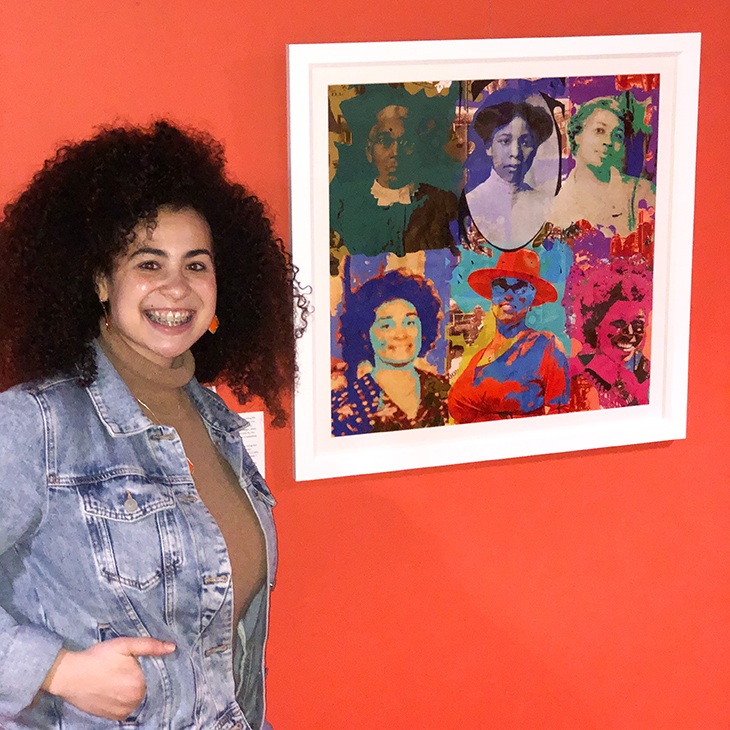
Senior celebrates family’s history of Black women farmers through award-winning artwork
Wednesday, February 24, 2021
Studio Art senior Shyanne Dickey recently won OSU’s Division of Student Affairs Celebrating Black Lives Art Contest with her piece, “Reigning Black Women Farmers.” Dickey, who hails from Tucson, Arizona, ventured outside her normal medium of oil paints to create the digital print. The collage of edited photos depicts six generations of women from Dickey’s family who have worked farmland in rural west Kansas for more than 150 years.
“We’re known as the Exodusters, ex-slaves who moved to Kansas after the Civil War,” Dickey said. “My family settled in Hodgeman County, where they were the first Black farmers to reside. And they’re still there to this day.”
While being Black farmers is a rarity in itself, being Black female farmers is even more novel, Dickey explained.
“When we think of farmland, we think of a white male farmer and the land being passed down to his oldest son,” Dickey said. “But in our case, it was passed down to my mom, who was the seventh kid and the second girl out of 12 siblings. And now my sister and her husband are teaching their kids the tradition.”
One of Dickey’s main motivations for creating “Reigning Black Women Farmers” was to bring awareness to a lesser-known part of American history — the migration of Black people to Kansas in the late 1800s — while simultaneously sharing the inspiring resiliency of her own family.
“My older sisters said to me, ‘God has blessed you to be able to speak to people about something that's not been talked about,’” Dickey said. “They’re happy that finally someone’s taking a stand to talk about our past. We weren’t just slaves. We became successful. We overcame. It’s powerful to consider that we are now owners of the land that we were once slaves to.”
Professor Ann Dawkins, Dickey’s oil painting mentor at OSU, noted that “there’s such pride and strength to the way Shyanne has depicted the matriarchal lineage of her family.”
“She portrays them like celebrities, which they 100 percent deserve!” Dawkins said. “Turning the erasure of Black women on its head, instead she’s celebrating their contributions with saturated color in an upfront way that’s difficult to ignore. As far as the medium goes, the digital print is what that piece called for. It was the most effective way for her to communicate that vision.”
That saturated, high-contrast style of Dickey’s piece was inspired by Andy Warhol’s “Reigning Queens” screenprinted series, which features portraits of three European queens and one African queen. Dickey wanted to illustrate a similar power present in her own family with photos of her great-great-great grandmother Eliza Bradshaw, Eliza’s granddaughter Mattie Bradshaw, Dickey’s great-grandmother Berdia Haller Bradshaw, grandmother Bobbie Bradshaw, mom Lisa Dickey and older sister Jazmin Wagner.
“My mom raised us to be strong women,” Dickey said. “She tells us, ‘You can’t be afraid to talk to people, to tell them we belong here. We have a right to be here.’ My family has faced some trials and tribulations, but it’s made them beautiful leaders and role models that I can look up to — that all different individuals who meet them can look up to.”
Dickey’s father has also been a source of inspiration in her life, serving as the catalyst for Dickey’s decision to pursue fine art.
“As a kid, he would draw us little sketches of anything that we wanted,” Dickey said. “It’s funny because, with him being a football coach and all about sports, he still had this softer side to him. He said if he didn't choose football, he would have done something in art. So I thought, ‘Well, I guess I'll be your artist.’”
Dickey plans to continue creating pieces that celebrate her family and the cultures and history they are a part of. “She knows how important the work is to her family and Black men and women everywhere, and that is a force that drives her,” Dawkins said.
“The work is part of a larger conversation of Black figurative painters that have shifted the dialogue around painting and identity,” Dawkins continued. “Visibility is so important, especially here in Oklahoma where Black communities are so underrepresented.”
The reaction to “Reigning Black Women Farmers” has been overwhelmingly positive, Dickey said, which is welcome encouragement as she moves forward in her work.
“I hope that when people view this piece, they see the strength and courage that these women had,” Dickey said. “My mom said, ‘You can't be weak-minded. This is a man's world. You have to be strong and stand your ground.’ I hope when people see this, they … let their minds be open to anyone being a farmer — Hispanic, Asians, Blacks, anyone can hold that position. It's not given to just a white male. That power is given to anyone who has the courage and strength to till the land.”
MEDIA CONTACT: Elizabeth Gosney | College of Arts and Sciences | 405-744-7497 | egosney@okstate.edu
